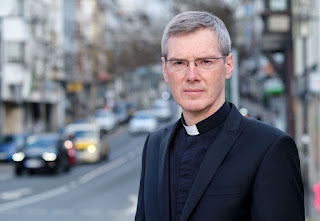Putative new Head for CDF applauds direction of German Church
Bishop writes letter to employees and committed people in the Diocese of Hildesheim after the Synodal Way. He was much talked about a few weeks ago as the new head of the Congregation for the Doctrine of the Faith.
Heiner Wilmer takes stock of church reform projects and agrees on the future path of the diocese
It is a summary of the Synodal Path: Hildesheim bishop Dr Heiner Wilmer SCJ addresses all clergymen, the employees of the Diocese of Hildesheim and the faithful in the Diocese who volunteer for the church in Hildesheim.
"We have turbulent times behind us," writes the bishop about the three-year, nationwide reform project that was initiated due to the countless cases of sexualized violence within the Catholic Church. The Fifth Synodal Assembly took place last weekend.
In the general meetings, but also in letters to him as well as in telephone calls and personal conversations, expectations and hopes were expressed, which were not all fulfilled. "Some of the resolutions did not go far enough, others already saw a contradiction in the texts with the teaching of the church," said Wilmer about the range of positions expressed.
His task as bishop is to serve the unity of the church. Therefore, at the end of the synodal path, he was grateful that, after serious and intensive struggle, significant steps had been taken together: “We will bring important topics into the world church discussion, continue to discuss reform issues in Germany or take them with us to the dioceses. Above all, however, we will continue to talk, the Synodal Path is not over.”
The Synodal Committee plays a special role in this. This is to prepare a synodal council for the Catholic Church in Germany. In the letter, Wilmer is pleased that Sister Maria Elisabeth Bücker OSB from the Marienrode monastery near Hildesheim was elected to the Synodal Committee.
The Bishop of Hildesheim considers it positive that during the Synodal Path the intention was strengthened to open up access to the preaching service for qualified believers in Eucharistic celebrations and to hold talks with the Vatican on this. He also welcomes the fact that a working group is to be set up to develop guidelines for blessing celebrations for same-sex couples and divorced people who have remarried.
According to Bishop Wilmer, the deliberations during the synodal path have “despite all the controversies led to numerous new insights, which are now being introduced into the World Synod initiated by Pope Francis, but also into the deliberations, committees and decisions on site, here with us in the Diocese of Hildesheim".
Wilmer emphasized that a number of important changes have already been made in the Diocese of Hildesheim, including the creation of a staff department for the prevention, intervention and processing of sexualized violence as well as processing projects that have already been implemented or are being planned.
He also mentioned the new basic order of church service for the Diocese and the Diocesan Pastoral Council introduced last autumn, which is made up of a majority of lay people and acts as the bishop's supreme advisory body.
For the near future, Wilmer announced the creation of the Diocesan Economic Council, which will replace the Diocese's Asset Management Council and Church Tax Council. A start is also being made on introducing model projects for new management models for parishes. "We will make full use of the possibilities provided for by canon law in order to spread the responsibility for leadership in the parishes over several shoulders where it is advisable," formulated the bishop.
At other points in the letter, Wilmer makes it clear how much the concerns of the Synodal Path are important to him and how they can be pursued with commitment in the Diocese of Hildesheim. Addressing the clergy, the employees and volunteers in the diocese, he writes: “I am grateful for the dialogue that we started together about the further path of our Diocese and ask you to continue it critically and constructively.”
The votes of the Synodal Path at a glance
The fifth and final plenary session of the Synodal Path in Frankfurt (March 9-11) passed resolutions on reforms in the Catholic Church. In total, the 210 delegates discussed ten papers from Thursday to Saturday. Eight texts were adopted at second reading. One text was referred to the yet to be established Synodal Committee for further processing. A text passed the first reading and has therefore not yet been finally decided.










.jpeg)

Comments